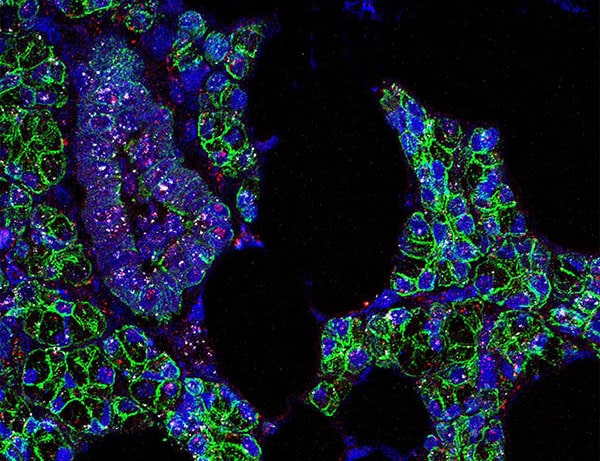Scientists find evidence that novel coronavirus infects the mouth’s cells
NIH-funded findings point to a role for saliva in SARS-CoV-2 transmission
An international team of scientists has found evidence that SARS-CoV-2, the virus that causes COVID-19, infects cells in the mouth. While it’s well known that the upper airways and lungs are primary sites of SARS-CoV-2 infection, there are clues the virus can infect cells in other parts of the body, such as the digestive system, blood vessels, kidneys and, as this new study shows, the mouth. The potential of the virus to infect multiple areas of the body might help explain the wide-ranging symptoms experienced by COVID-19 patients, including oral symptoms such as taste loss, dry mouth and blistering. Moreover, the findings point to the possibility that the mouth plays a role in transmitting SARS-CoV-2 to the lungs or digestive system via saliva laden with virus from infected oral cells. A better understanding of the mouth’s involvement could inform strategies to reduce viral transmission within and outside the body. The team was led by researchers at the National Institutes of Health and the University of North Carolina at Chapel Hill.
“Due to NIH’s all-hands-on-deck response to the pandemic, researchers at the National Institute of Dental and Craniofacial Research were able to quickly pivot and apply their expertise in oral biology and medicine to answering key questions about COVID-19,” said NIDCR Director Rena D’Souza, D.D.S., M.S., Ph.D. “The power of this approach is exemplified by the efforts of this scientific team, who identified a likely role for the mouth in SARS-CoV-2 infection and transmission, a finding that adds to knowledge critical for combatting this disease.”
The study, published online March 25, 2021 in Nature Medicine, was led by Blake M. Warner, D.D.S., Ph.D., M.P.H., assistant clinical investigator and chief of NIDCR’s Salivary Disorders Unit, and Kevin M. Byrd, D.D.S., Ph.D., at the time an assistant professor in the Adams School of Dentistry at the University of North Carolina at Chapel Hill. Byrd is now an Anthony R. Volpe Research Scholar at the American Dental Association Science and Research Institute. Ni Huang, Ph.D., of the Wellcome Sanger Institute in Cambridge, U.K., and Paola Perez, Ph.D., of NIDCR, were co-first authors.

RNA for SARS-CoV-2 (pink) and the ACE2 receptor (white) was found in salivary gland cells, which are outlined in green.
This page was last updated on Friday, January 21, 2022